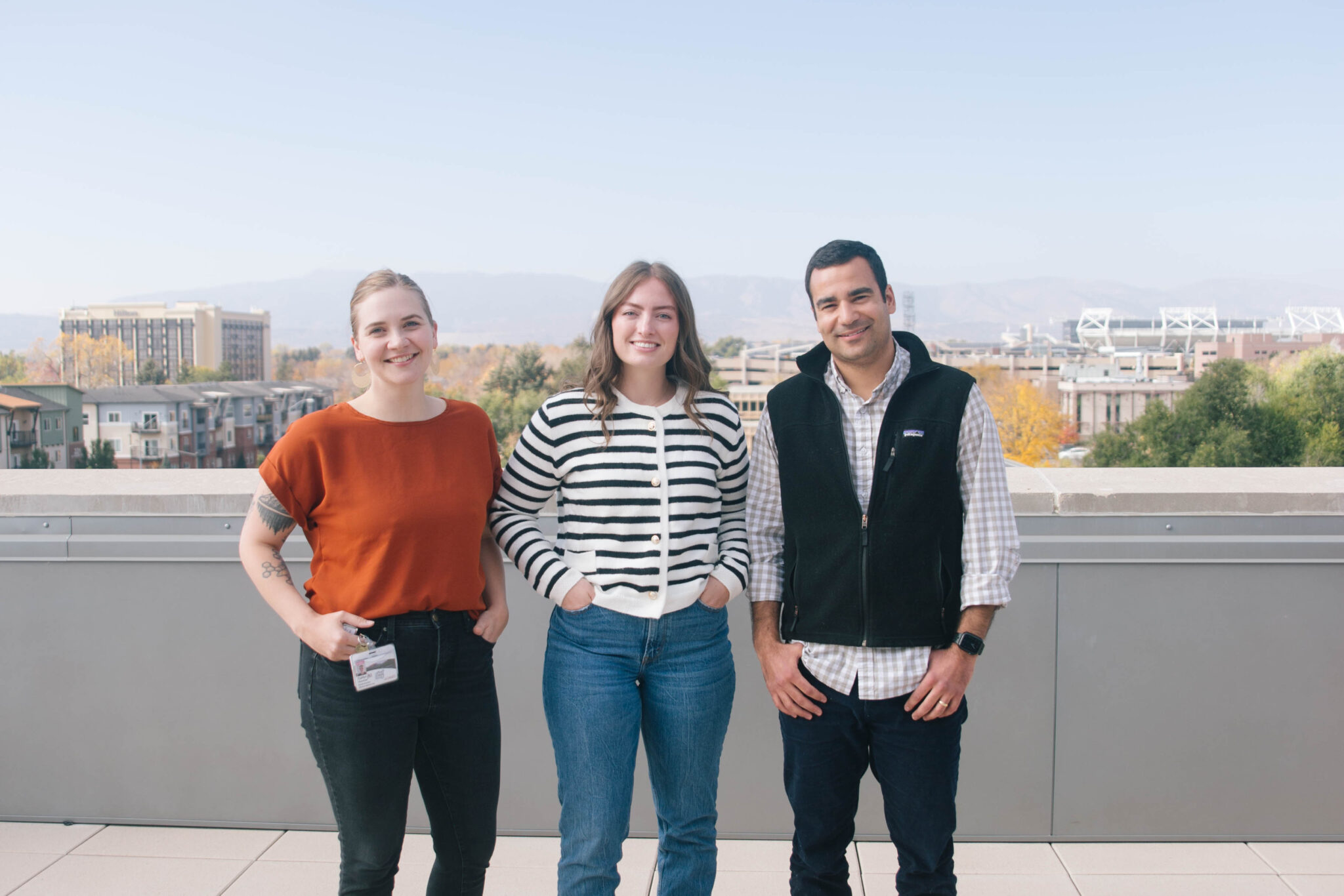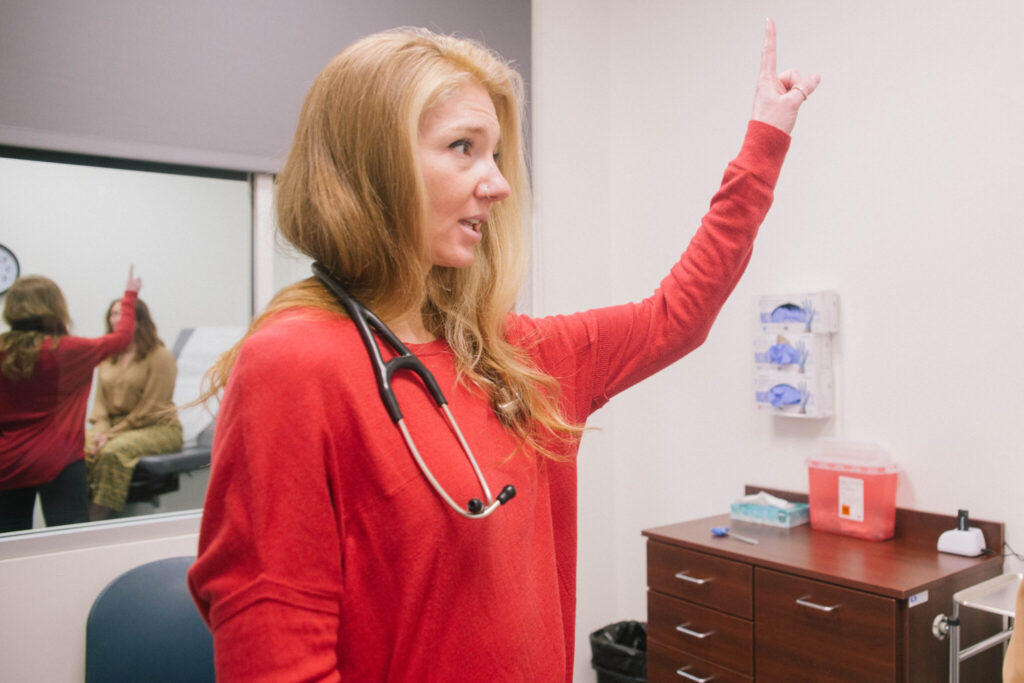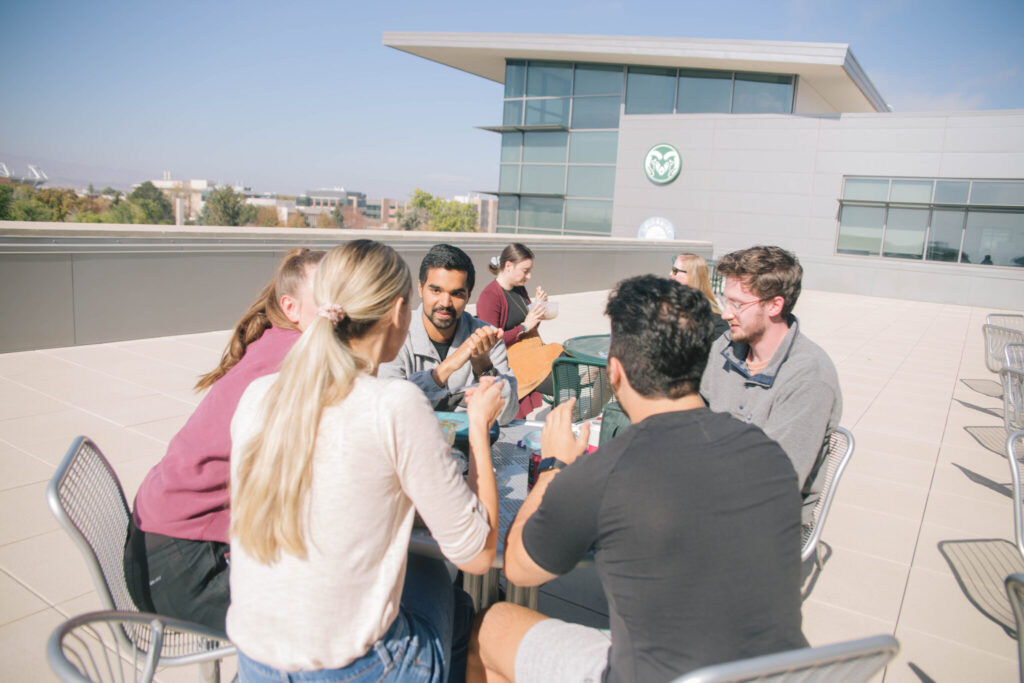
Megan Mazzotta has known she wanted to become a doctor since preschool.
When COVID hit, KC Hummer reevaluated her life and pivoted from a career in environmental education to pursue medicine.
Raj Trikha is fueled by connecting with people and wants to have a tangible impact on the personal health choices they make in life.
The trio, part of the University of Colorado School of Medicine (CU SOM) at Colorado State University branch campus’s inaugural class, pioneered the innovative, modernized “trek” curriculum (developed by Anschutz campus faculty for all CU SOM students). Now in their third year, they are about to embark on their final “trail” to graduation.
The trek
When they arrived on campus in 2021, the students launched their journey into medicine on the “plains,” gaining a blend of foundational medical science education, health systems science, and hands-on clinical skills training right off the bat. As they progressed through the “foothills,” they dove deeper into the clinical experience before immersing in advanced science and discoveries at “tree line” to solidly prepare for the “alpine ascent” of clinical concentrations and the “summit” of graduating in 2025 and heading off to residency.

As they approach their fourth and final year, the inaugural class of the CU SOM at CSU is the first to select a trail, composed of four weeks of experiential immersions and an interactive, project-based longitudinal curriculum over several months. CSU is launching two trail offerings, a One Health trail and a Health Systems Leadership trail, as well as two new electives in public health and translational medicine that the students can take in their final year.
“The students just finished their core clinical year and are now honing in on what they want to do for the rest of their lives,” said Dr. Christie Reimer, assistant dean of the CU SOM at CSU and a primary care general internist with UCHealth. “As they embark on their chosen trails in January, the CSU campus will focus on providing opportunities for students to become One Health advocates and healthcare system leaders.”
Modern medicine in an interconnected world
The medical school’s revamped curriculum encompasses a One Health framework emphasizing a holistic focus on contemporary issues in health and society.
“I wanted to be in medical school at CSU not only because of the smaller, tight-knit community here, but also because of CSU’s connection to One Health; that was really important to me,” said Mazzotta.
Students who take the new public health elective will examine current issues such as the opioid epidemic, obesity and racism in health care from a medical and public health perspective to better understand how experts from different fields approach the same topic.
“When facing complex problems like climate change and emerging diseases, we cannot address them from one perspective,” said Dr. Marta Rowh, director of the advanced science curriculum, who orchestrated the creation of the public health elective and co-directs the One Health trail. “One Health asks us to work to understand these problems from the perspectives of human, animal and environmental health, and the ways they are all interrelated, to understand the bigger picture.”
The new translational medicine elective asks students to identify a real-world modern problem, learn fundamental tools to approach translational research and medicine, and design and present realistic projects and solutions. The course includes an overview of funding, the importance of networking and team science, and the basics of regulatory issues, pilot studies, clinical study designs and intellectual property, all while connecting students with valuable networking resources across northern Colorado.
“I want our students to be able to identify gaps in clinical settings and to tap into translational research to address unmet needs they encounter so that they can have an impactful career,” said Jeff Wilusz, professor and microbiology content director.
The soon-to-be-launched One Health and Health Systems Leadership trails are designed to go beyond concepts and equip students with real-world tools and skills they can use in their medical careers from day one.
Leave the road, take the trails

“The problems we are going to face in the future will require a much broader perspective than my generation was taught in medical school,” said Rowh. “There are new ways to interact with the world and make it better, and we can see that positive change coming — these students are passionate, motivated and ready to take on these challenges.”
The One Health trail dives into how human, animal and environmental health are interconnected through investigating the food supply chain, local arthropod control, and wildlife and livestock management, as well as applying One Health methods to solving problems. The course includes working with the Centers for Disease Control and Prevention, the Department of Public Health, and other local organizations, companies and businesses to give students a variety of experiences that demonstrate impacts to health outside of the clinical setting. They will also gain experience teaching One Health concepts to the general public out in the community.
“What we’ve set out to do with the One Health trail is complement classroom activities with immersive experiences in our surrounding communities so that students can apply what they’ve learned,” said Dr. Anuja Riles, director of One Health for CU SOM at CSU, co-director of the One Health trail and vice chief of staff at Banner Health’s Fort Collins Medical Center, where she also practices pediatrics. “One reason students choose to come to the CSU branch campus is because they’re interested in One Health, and it has been wonderful to see them grow over the past two years — they are super excited about being in the community.”
In the Health Systems and Leadership trail, students will learn medical system leadership skills on every level, from the business and finance side of things to interpersonal aspects. The course includes skill-building sessions on conflict resolution, negotiation and building diversity and inclusion initiatives in large health systems. Physician leaders from various settings who serve in community leadership roles will visit the class, and students will be paired with a mentor from a hospital in northern Colorado to shadow and learn from.
“It is hard to imagine a career for yourself that you can’t see,” said Dr. Rebecca Bade, assistant clinical professor at the School of Medicine and an internal medicine hospitalist at UCHealth. “In this trail, students interact with physicians they would otherwise not get to meet during their time in medical school and receive formal training in leadership, which is something that most physicians do not get. This will allow the students to envision different opportunities for their own futures.”
Medical changemakers
Rotating through different clinical settings in their second year allowed the students to gain confidence in choosing a specialty.
“For me, that was the most valuable part of the curriculum,” said Trikha. After seeing children he worked with in pediatrics develop over the course of a year and working with family medicine physicians who impressed and inspired him, Trikha plans go into primary care and hopes to build lasting and meaningful relationships with families. “I want to be a family doctor who can talk to people in any situation at any time.”
Similar positive clinical experiences led Mazzotta to pursue obstetrics and gynecology and Hummer to set her sights on practicing emergency medicine.

“As the trail-blazing class, we’re excited to be able to share our experiences with and help guide the incoming classes of students behind us,” said Trikha. Aside from building a foundation for the culture of CSU’s medical school branch and playing a key role in designing multiple aspects of the new curriculum, a big part of their legacy was bringing in the fun.
“We love each other, support each other and spend a lot of time together,” Mazzotta said. This led to them creating a medical school association that hosts monthly social gatherings and a Friday night soccer league for all the classes of students to take part in.
“Here at CSU, we are fortunate in that we have these students that elected to come here from the very start specifically because they identify as community leaders, movers and shakers,” said Bade.
After they reach the end of their trails next fall, the inaugural class will prepare to graduate and set their sights on the peak experience of residency.
“We chose to come to the CSU branch to be part of this inaugural class because we are passionate about building community,” said Hummer. “It is so exciting to see the incoming classes follow in our footsteps after we helped build and shape the program, and very rewarding to see all the pieces come together.”